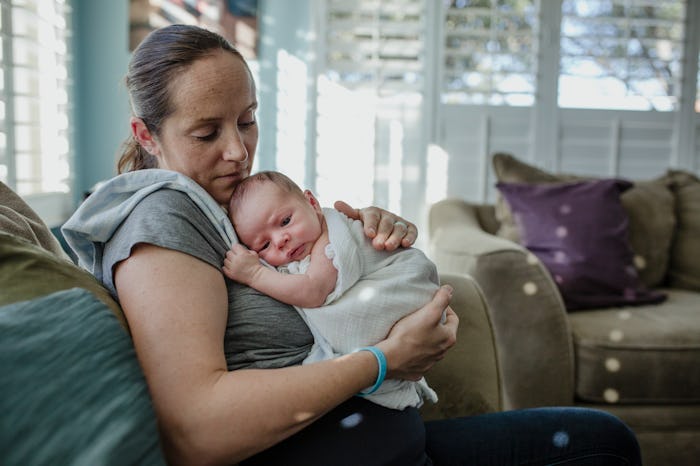Life

Why Do Babies Lose Weight After Birth? Experts Explain
Birth is wrought with a million questions — some easily explained, and others less so. Even if you took a birthing class to learn the ins and outs of actually delivering your baby, you may still have questions about your baby post-birth. For some new parents, it's alarming to leave the hospital with your baby losing weight after birth, but it turns out, it's totally normal and expected.
When my oldest son was born, he weighed nearly 9 pounds. His size was expected based on ultrasound estimations, but I was less prepared for his weight to drop in the days following his birth. My pediatrician reassured me that his weight loss was normal, but I still questioned whether or not something I was doing could have contributed to this. Was he eating enough? Did he need formula supplements? So. Many. Questions.
"Babies are transitioning from an environment where they were essentially submerged in hydrating fluid. After birth, babies dry out their skin, lungs, and other organs as they begin to live outside the womb and breath air," pediatrician Dr. Natasha Burgert, M.D., tells Romper. "The water loss experienced during that transition is reflected in weight loss."
Simply put, some weight loss after birth is expected because your baby's body is no longer hanging on to that excess fluid. How much of a loss your baby experiences will vary. Dr. Jennifer Trachtenberg, a pediatrician and Spokesdoctor for the American Academy of Pediatrics, tells Romper, "Babies can lose between 7 to 10% of their birthweight, but should gain it back by two weeks of age."
While all babies, regardless of whether they are breast or bottle-fed, will likely experience some weight loss due to fluid reduction, Dr. Whitney Casares, pediatrician and author of The New Baby Blueprint: Caring for You and Your Little One, tells Romper that the start of breastfeeding can also contribute to a baby's weight loss immediately after birth.
"Babies are often sleepy in the first 24 to 72 hours after they are born, and mom’s milk supply is limited in volume at first. It’s generally not until day three to four when mom starts making copious milk and baby is alert enough to take it," Casares tells Romper. "Breastfeeding is a two-way feedback loop, and it takes a little while for that loop to get in full-swing."
Shortly after birth, you will probably have a nurse or midwife advise you to keep track of your baby's diaper changes and feedings. (If you've already given birth, you know exactly what those little paper charts look like.) Just like keeping record of this information can help determine your baby's health, so can their weight changes after birth.
"There are numerous factors including type of birth, perinatal care and family history that can explain the safe variation in weight loss," Burgert tells Romper, noting that although parents may be tempted to keep track of a baby's weight on their own, pediatricians are more than happy to help guide the process. "Getting daily weights, buying home scales, or force-feeding a baby is typically not recommended without physician guidance. Every pediatrician is well-versed in managing infant weight loss, just give your child's doc a call."
With a newborn, you'll frequent the pediatrician's office for checkups. A few days after birth, weekly, then monthly visits are common. And when you're not there, you'll have their line on speed dial. That's just par for the course. But, when it comes to regaining birth weight, at what point should you address the issue with your child's doctor?
"It’s important to go to your scheduled pediatrician visits within the first few weeks to make sure weight gain and growth is adequate," Trachtenberg tells Romper. "In general, baby will begin to gain about an ounce a day the first month, and after a week have wet diapers at least every four to six hours. If baby not feeding well, lethargic, or you are concerned, it's best to consult your pediatrician for a weigh-in and visit."
Experts:
Natasha Burgert, MD, FAAP, pediatrician in South Overland Park, KS
Whitney Casares, M.D., M.P.H., F.A.A.P. is the author of The New Baby Blueprint: Caring for You and Your Little One
Dr. Jennifer Trachtenberg, pediatrician and assistant clinical professor of pediatrics at The Icahn School of Medicine at Mount Sinai
This article was originally published on